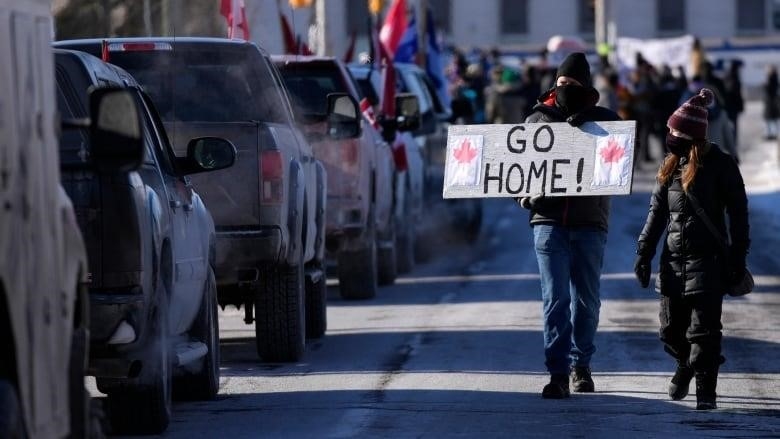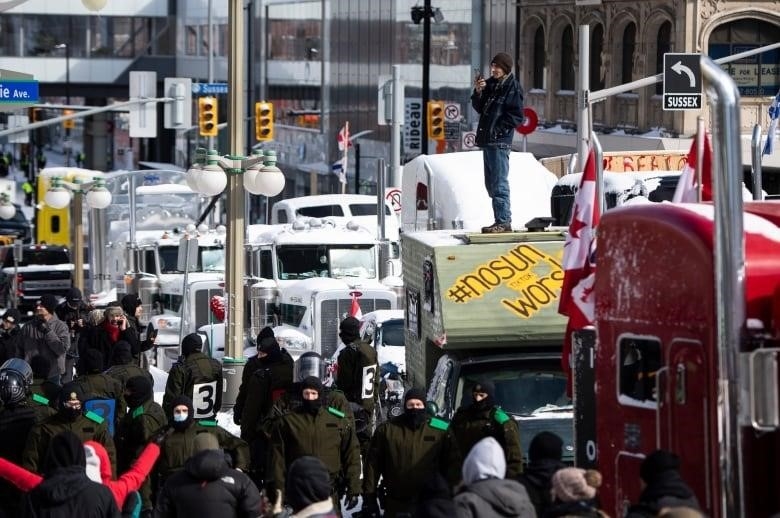
Recommendations: apologies, more research, and better planning for the futur
The Ottawa People’s Commission says that the city can’t move on from the convoy protests of last winter until all levels of government do something to win back the trust of the people who live there.
This conclusion is in the second part of the commission’s report, which is a summary of what more than 200 people and businesses in the area said.
The grassroots commission is different from thefederal and city reviews of what happened in OttawaIn January and February 2022, said it wanted to hear from people in the community about the Effects of the COVID-19 protest that turned into an occupation last winter.
The commission’s first report, which came out earlier this year, focused on how residents felt during what they called a violent protest that led to widespread violations of human rights in the city’s downtown. The majority of residents said they felt abandoned during this time.
The second report, which came out on Tuesday, looks at how the city, province, and federal government can help.
“Even though some people say the community should’move on’ and ‘get over it,'” the report says, “the commission believes it is urgent and important for the City of Ottawa and other governments to provide a substantive, even transformative, response.”
The commission has come up with 25 suggestions and a timeline for completing them, but governments are not required to act on them.
More than half of the suggestions are for the City of Ottawa, and the rest are for all levels of government.
Getting ready for possible emergencie
The commission told the city that it should make policies and set up committees so that it would be ready for large protests or emergencies in the future.
The report also says that the city should focus on communication when changing its emergency management program.
“Communication was sporadic and all over the place. It was just as annoying to tell people who live downtown to “avoid downtown” as it was to say that the occupation was “mostly peaceful.”” The report came to an end.
It says that Ottawa Public Health didn’t issue a statement of concern until the occupation had been going on for two weeks. They also didn’t talk about the bad effects of diesel fumes until four days later, telling people to stay away from the area.

The report suggests that the city set up an advisory committee to find out what residents need in times of crisis and make a plan to help vulnerable people, backed up by regular training.
In order to do this, it suggests that public health and fire services work together to make a “needs map” that shows which neighborhoods and households are most likely to be in danger during an emergency. A guide like this would take into account race, disability, and gender identity, among other things.
The city must also make sure that “lifesaving services” like public transportation, food programs, harm reduction, and emergency shelters are always available to its residents.
The commission also suggests that the city make its own human rights charter so it can hold itself accountable in times of crisis, sign the UN Declaration on the Rights of Indigenous People, and talk to Indigenous groups to make a policy that will help it work better with local groups.
Apology and compensatio
The report also asks for official apologies from all three levels of government to the people of Ottawa.
“Almost everyone who testified about how the convoy affected them spoke with a mix of disbelief, sadness, and anger, saying they felt completely abandoned by the people they count on to keep them safe,” the report says.
The commissioners suggest that the city hold a series of town halls so that city leaders can hear from residents directly how they were affected.
In addition to the ongoing reviews, the commission suggests that some police officers’ actions be looked into by an outside group.
It says that all three levels of government should look into making up for violations of human rights and paying for lost wages, business losses, and other costs that the convoy occupation caused.
